Biosecurity is the management of the risk of pests and diseases entering, emerging, establishing or spreading in Australia and causing harm to animals, plants or human health, the economy, the environment and the community.
Guarding our international gateways in 2018
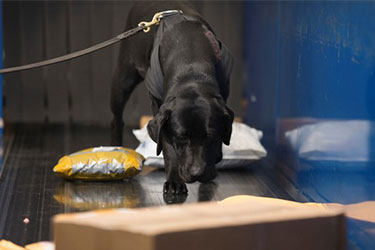
One of our detector dogs on the case at the Melbourne International Mail Facility.
2018 was a very busy year for the department in stopping biosecurity threats at Australia’s international airports, mail centres and cruise ship terminals.
Deputy Secretary for Biosecurity, Lyn O’Connell, said that 275,000 items were intercepted across our international airports, with a further 73,000 items intercepted at international mail centres and 2,400 items at various cruise ship terminals around Australia.
‘This high rate of detection and interception highlights the importance of our frontline work in managing the risk of biosecurity threats from entering Australia,’ said Ms O’Connell.
‘If we had not made these interceptions Australia would be at risk of serious animal and plant pests and diseases, and exotic weeds and plants, entering our country and impacting our $60 billion agriculture industry, unique environment, native flora and fauna, tourism industry and way of life.’
Continue reading about guarding our international gateways in 2018
Once again the department’s biosecurity detector dogs played a vital role in our frontline defences, notching up 45,000 interceptions at our international airports and 14,000 interceptions at international mail centres during 2018.
‘The expertise of our Biosecurity Officers gives Australia a world-leading model in managing the risk of biosecurity pests, diseases and plants arriving here. They work with our detector dogs, as well as the latest in detection technology, such as the new RTT 3D X-ray machine we are currently trialling in Melbourne.’
Some of the more interesting interceptions made last year include:
- 10 live succulent plants concealed in chip packets sent by express mail from Korea were detected by X-ray machines at the Sydney Gateway Facility.
- Eight giant African snails intercepted during a routine baggage inspection at Perth International airport.
- A passenger rightfully declared three colourful lollipops they bought in Mexico, each containing a real and thankfully long dead, scorpion inside at Brisbane Airport.
- A beautifully decorated box of dried scorpions, intended for human consumption, was intercepted from China at the Sydney Gateway Facility.
- A passenger handed over an entire pillowcase stuffed with unidentified seeds.
- A stuffed king cobra was intercepted in a parcel sent from Indonesia.
- A passenger unsuccessfully tried to sneak in two kilograms of kola nuts, a nut native to the tropical rainforests of Africa, into Perth International Airport by making a false declaration on their Incoming Passenger Card.
- A family returning from a holiday in Bali were surprised to find an Asian black-spined toad had hopped into their luggage. They did the right thing and immediately reported the pest.
- A passenger travelling from Vietnam via Singapore, unsuccessfully tried to smuggle four kilograms of undeclared fresh fruit and vegetables, through Darwin International Airport.
- Mouldy yak cheese and fungus-infested caterpillars were detected at Cairns International Airport.
- Biosecurity and Australian Border Force officers intercepted two live squirrels, allegedly smuggled in by an Australian resident returning from Bali, at Brisbane Airport.
- An attempted illegal import of citrus budwood was foiled at Brisbane Airport.
‘If you bring anything of biosecurity concern into Australia, including foodstuffs, animal and plant products, muddy clothing and equipment, then make sure you declare it.
‘Failure to do so could result in confiscation of the biosecurity risk items, and may even lead to fines,’ said Ms O’Connell.
The high number of detections in 2018 confirm we are very active at Australia’s international airports, mail centres and cruise ship terminals. Take the time and view our travelling to Australia video and remember, don’t be sorry, just declare it.
Find out more about travelling or sending goods to Australia.
Managing biosecurity risks at the Post Entry Quarantine Facility in 2018
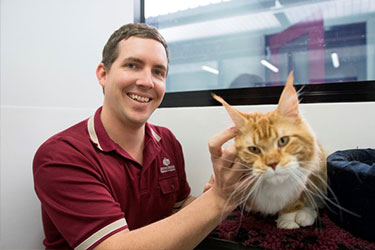
A furry visitor at the PEQ.
The Mickleham Post Entry Quarantine facility (PEQ) had its biggest year yet in 2018, with animals and plants from all over the globe spending the last leg of their journeys to Australia in post entry quarantine in Mickleham, Victoria.
Pre-import requirements, at-border management, and post entry quarantine are all part of the biosecurity continuum that safeguards our $60 billion agriculture industry, unique environment, native flora and fauna, tourism industry and way of life.
Peter Finnin, Assistant Secretary of PEQ Operations, said staff at the PEQ worked tirelessly in 2018 to manage high risk plant and animal imports.
‘Imported animals and plants must undergo quarantine on arrival in Australia. During the quarantine period, we monitor the imports and ensure any disease concerns are eliminated,’ said Dr Finnin.
Continue reading about managing biosecurity risks at the Post Entry Quarantine Facility in 2018
‘The PEQ has been open for three years, and we’ve never had a bigger year. We’ve had more cats and dogs through the door than ever, as well as alpacas, ducks and pigeons.
‘We successfully hosted and processed nine alpacas, 2,062 cats, 4,580 dogs, 465 horses, 11,207 hatching eggs, 355 live birds and 104 shipments of imported plant material.’
Staff at the PEQ have also been working to upgrade IT systems like the Post Entry Booking System, upskill staff with health certificates, improve communication with the community and better manage administrative functions.
In 2012, the Australian Government invested $379.9 million to consolidate Australia’s post entry quarantine facilities to better meet Australia’s future post entry quarantine needs.
Find out more about importing goods to Australia.
Keeping African swine fever out of Australia
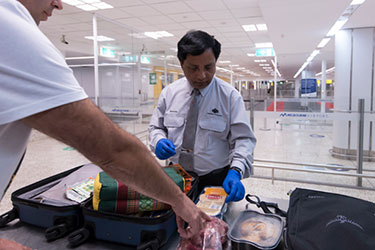
Screening for banned pork products has increased across passenger and mail pathways.
In response to the global spread of African swine fever (ASF), screening for banned pork products has increased at our international borders. ASF is not present in Australia but if introduced, could have a substantial impact on Australia’s pork industry.
Recent test results show some of the pork products seized at our international airports and mail centres were contaminated with ASF.
Dr Mark Schipp, Australia’s Chief Veterinary Officer, said these results reinforce the need for people to be aware of what can’t be brought into Australia.
‘If you are travelling or returning to Australia from overseas, or purchasing goods online, you have a role in keeping this disease out. It’s not just the responsibility of biosecurity authorities and our pig industry,’ said Dr Schipp.
Continue reading about keeping African swine fever out of Australia
‘The best thing to do is not to bring meat or meat products with you to Australia. This includes pork and products like pork jerky and pork biltong.
‘Passengers also need to clean equipment, shoes and clothing before they pack their bags, especially if they’ve been in contact with pigs or have been in a rural area overseas where ASF is present.’
Passengers arriving in Australia are required by law to complete an Incoming Passenger Card. On this card you must be honest and declare if you are carrying any animal products or other items that are a biosecurity risk.
Similarly online shoppers should be aware of where their goods are coming from and check whether there are any import requirements before making your purchase. This includes all personal consignments of smallgoods, pork jerky and pork biltong.
Now is a good time to remind friends and family overseas not to send you goods that are a biosecurity risk and that are likely to be intercepted at our international mail centre.
While ASF is not present in Australia, all pig owners also need to be alert and take action.
Pig producers and backyard pig owners can use simple biosecurity practices to prevent this disease occurring in their animals.
‘Feeding your pig the right food not only makes for a happy pig but also helps keep them healthy and disease free,’ said Dr Schipp.
‘Pig owners must not feed their pigs meat, meat products or imported dairy products. This is known as swill feeding and it is prohibited in all Australian states and territories.’
Because viruses can survive long periods in some products, swill feeding has the potential to introduce ASF to Australia’s pig population as well as other serious diseases, including foot and mouth disease.
Discarded food products can also be consumed by wild animals which can carry and spread these diseases.
Pig owners can get advice on how to keep their pigs healthy at farmbiosecurity.com.au.
Importantly, if you do suspect a disease in your pigs, you must report this to your local vet or animal health authority. You can get in touch with your state or territory animal health authority by phoning the Emergency Animal Disease Watch Hotline on 1800 675 888 from anywhere in Australia.
Find out more about ASF.
Australian farmers safe from banana freckle
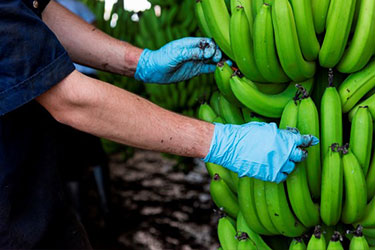
Australians eat over five million bananas every day.
Queensland banana growers have avoided a serious biosecurity risk with the Northern Territory officially declared banana freckle free. The successful eradication follows a five year joint effort between the Australian government, state and territory governments and the banana industry.
Banana freckle is a pest of banana leaves and fruit caused by a fungal pathogen, which reduces the productivity of banana plants.
Dr Kim Ritman, the Australian Chief Plant Protection Officer, said eradication is a tough business, and this is a big win for banana growers across the country.
‘The eradication in the Northern Territory will provide certainty for banana growers in Queensland, New South Wales and Western Australia,’ said Dr Ritman.
Continue reading about Australian farmers being saved from banana freckle
‘Protecting our $1.2 billion Australian banana industry is vital, bananas are our number-one selling supermarket product by volume, and all of them are grown right here in Australia.
‘The partnership between the Northern Territory and the Australian Banana Growers Council was an essential component of the eradication program. The efforts of banana growers who participated in the program in the Northern Territory should also be commended.’
The Australian Government contributed $6 million to the national response program led by the Northern Territory, and assisted with surveillance, monitoring and response planning of the disease.
The banana industry funded close to half of the response cost ($11.9 million) and worked alongside the Northern Territory to provide technical expertise and knowledge of the industry.
Banana freckle was detected on Cavendish bananas in the Northern Territory in 2013. The fungal disease isn't a health risk but does stunt the growth of the plant and causes spotting on the fruit, reducing its commercial value.
Had the disease spread to Queensland, strict controls would have been put in place and no fruit would have been able to leave the region to be sold to supermarkets across Australia.
The response program had four phases: destruction of host material, a host-free period of at least six months including a full wet season, a sentinel phase of disease-free banana plants monitored for banana freckle, and finally assessment of proof of freedom.
Biosecurity is shared responsibility and everyone has a role to play. Find out more about the banana freckle eradication program.
Biosecurity touches down at Newcastle Airport
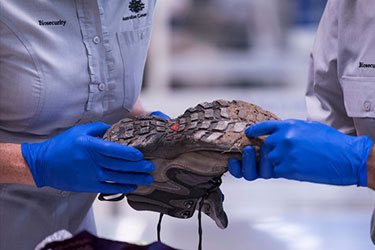
Hiking boots with organic material being inspected for biosecurity risk.
Our Biosecurity Officers were ready and waiting to manage any potential biosecurity risk as international flights to Newcastle Airport commenced late last year.
For international travellers, a patch of dirt on an item might seem trivial, but protecting our $60 billion agriculture industry, unique environment, native flora and fauna, tourism industry and way of life is serious business.
Inger Nieuwkamp, Director, Inspection Services Group, Sydney Biosecurity Operations Division, said if travellers were expecting to fly under the security radar at the small terminal, they can think again.
‘If passengers fail to declare or dispose of any biosecurity risk goods prior to inspection, or make a false declaration on the Incoming Passenger Card, they can face significant penalties,’ said Ms Nieuwkamp.
Continue reading about biosecurity touching down at Newcastle Airport
‘Newcastle Airport has a ‘swing gate’ for switching between domestic and international use. This means we can process our domestic travellers quickly and easily, and then make the switch for international arrivals to be managed by our Biosecurity Officers when we need to.’
Biosecurity Officers at the airport use X-ray machines and physical inspections to screen and assess any potential risk items, which include certain foods, plants, seeds, wood and items made from animal material.
These items are a risk, because they could be carrying pests or diseases that can harm our environment, industries, plants, animals, and even our own health.
‘Passengers won’t come from just New Zealand, they can detour from other parts of the world, through Auckland and to Australia, and we’ll be ready for everything.’
More than 20 million international travellers moved through Australia’s airports in 2017 and the Department of Agriculture and Water Resources made about 300,000 interceptions. Newcastle Airport is the second international airport in New South Wales.
Biosecurity is a shared responsibility and everyone has a role to play. Before travelling, international passengers should find out what they can and can’t bring into the country. Remember, don’t be sorry, just declare it.
Find out more about travelling or sending goods to Australia.
Border finds: mustard sticks at Brisbane International Airport
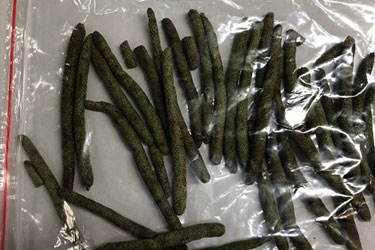
Mustard sticks.
Biosecurity Officers at Brisbane International Airport came across a spicy discovery when they found mustard sticks in a passenger’s bag.
The passenger arriving from Papua New Guinea declared two kilograms of piper betel, commonly known as mustard sticks and provided a phytosanitary certificate, government certification that the product is free of insects.
When conducting a thorough inspection of the passenger’s bag Biosecurity Officers found a further 250 grams of mustard sticks that had not been declared. The extra mustard sticks did not have a phytosanitary certificate.
The undeclared portion was destroyed and an infringement notice was issued to the passenger.
Certain food, plant material and animal items from overseas, such as mustard sticks, could introduce serious pests and diseases into Australia, devastating our valuable agriculture, tourism industries and unique environment.
When you send mail to Australia, make sure you accurately declare the contents of your package on the postal declaration label. Remember, don’t be sorry, just declare it.
Find out more about bringing or mailing goods to Australia.
Border finds: a bat visit in Melbourne

An Alashanian Pipistrelle bat at Cito Transport in Melbourne.
Biosecurity Officers at Cito Transport in Melbourne had a spooky surprise when they found a live bat in a shipping container late last year.
The bat had hitched a ride from Singapore and was discovered inside the container by Cito staff, who managed to safely capture the animal. Cito contacted the Department of Agriculture and Water Resources, and our Biosecurity Officers were dispatched to collect the bat.
Through molecular sequencing using a small piece of tissue, the bat was identified as Hypsugo alaschanicus, commonly known as Alashanian Pipistrelle. The breed is most commonly found in several countries in Asia.
Exotic bats can pose a huge risk to human health and our environment as they can carry diseases such as rabies, hendra virus and lyssavirus. There is also the risk of White Nose Syndrome, which has caused the death of more than 5 million bats across North America.
The adventurous bat was euthanised by a vet from the department and no other animals were found in the container.
Find out more about bringing or mailing goods to Australia.
We want your input
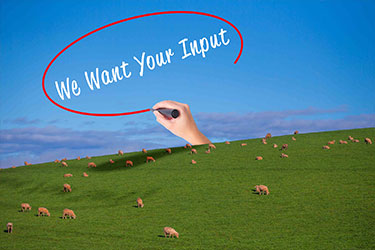
The department is currently seeking feedback on:
- a review of biosecurity import requirements for avocados from Chile
See the latest Import industry advice notices or Export industry and market access notices.
